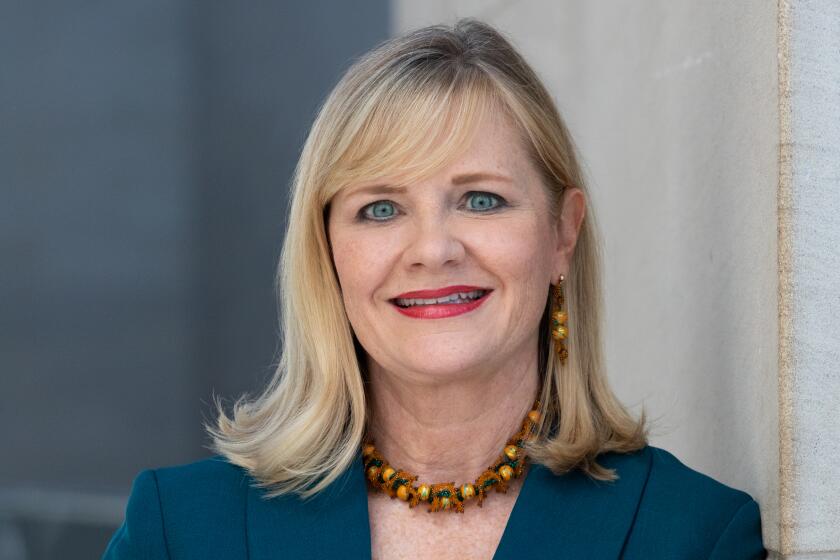Sour Notes : Orchestra Silenced, Survival in Doubt
The abrupt decision to cancel the 1986-87 season of the highly acclaimed Pasadena Chamber Orchestra has led to charges by the group’s conductor and some of his supporters that the board of directors overreacted to projected deficits.
The board canceled the season Sept. 10 after its founder and conductor, Robert Duerr--who had almost single-handedly raised the funds to keep the group going since its inception--announced plans to step down as music director next June to pursue other musical interests.
Upon hearing of his planned resignation, members voted to cancel the coming season, prompting Duerr to resign immediately and casting doubt on whether the orchestra will survive at all.
“Without Duerr the orchestra could not survive financially,” said Peggy Phelps, acting president of the Pasadena Chamber Orchestra’s board of directors.
“His charisma and fund-raising ability is the reason for its existence the last nine years,” Phelps said.
“We (the board) couldn’t see where the money for the season was coming from. The largest amount of money in the past came from a few people, and they have indicated a drawing back of major support” after Duerr’s announcement that he would leave the orchestra, she said.
Board members indicated that they were afraid they would be unable to raise the approximately $225,000 needed to finance even the coming season, despite the fact that Duerr had planned to conduct until June.
At at this point, all that remains of the orchestra is its name, its tax-exempt status and the 28 board members, who will meet Wednesday to discuss its future.
Salvage Job
“We will discuss if the orchestra can be salvaged,” said Richard Stever, a board member for five years.
Duerr said last week that he thought the group could survive if it were reorganized and its season scaled back until another music director could be found.
“I could have helped them rethink ideas on how to revamp the orchestra and search for a new music director,” Duerr said.
“The issue of my name is important” to major donors, Duerr said, but he added that he feels the orchestra could survive with a new music director.
Duerr said he would have remained indefinitely as music director if he had been relieved of fund-raising responsibilities.
‘Disowning My Own Child’
“This is a major step for me, disowning my own child,” he said. “But I am trying to become the best musician, not the best fund-raiser.”
The orchestra, founded nine years ago by Duerr at age 23, had become known as the only professional ensemble in Southern California to regularly present works by living composers as well as rarely heard Baroque pieces.
It had been scheduled to give six concerts at Ambassador Auditorium in Pasadena and at the Embassy Theater in Los Angeles this season, which was to run from Nov. 18 to May 19.
“I am saddened and discouraged at the board’s action,” Duerr said. “The decision was hasty and that hurts.
“It takes a product to get money. You can’t get it up front ahead of time, and I had a sense of where it was coming from. I would never have let the orchestra get a high deficit.”
Prize-Winning Organist
Duerr was a prize-winning organist who had just graduated from USC, where he also had studied conducting, when he founded the orchestra in 1977 to give himself more experience on the podium.
Initially his small ensemble was made up of friends and acquaintances who were young professionals and members of other orchestras. The group’s first-year budget was $12,000.
Nine years later, the budget had grown to more than $300,000, the 35-member ensemble had won six awards from the American Society of Composers, Authors and Publishers (ASCAP), and Duerr had introduced more than 20 new works of contemporary composers.
“The orchestra has provided a lot of exposure for musicians, provided music for the people of Southern California, commissioned 26 composers for original work and given Duerr an incredible springboard for his career,” Phelps said. “So it has done a lot of good for a lot of people.”
Survival After Duerr
The chief issue in deciding the orchestra’s future is whether the group can survive without Duerr.
Duerr conceded that most of the money given to the orchestra came from donors who knew him personally.
“I am not a professional fund-raiser,” said Duerr, now 32, who recently accepted an appointment as associate conductor of the Los Angeles Music Center Opera Company and will guest-conduct several operas and symphony programs in Los Angeles and elsewhere during the next year.
“We could not survive financially without him because people were giving to Duerr, not the orchestra,” said Shelley Alexander, who served as general manager of the group until its office closed Monday.
Total Dependency
“The orchestra had to grow out of total dependency on Bob doing the fund-raising, and it never did,” said Fritzie Culick, a former board member who helped found the orchestra.
“It could have been done without him, but the board couldn’t imagine this,” she said, adding that it relied on private donations rather than foundation grants to “a dangerous extent.”
Alexander cited a $68,000 deficit, including projected debts for the coming season, as the major reason for the season’s cancellation. However, there is strong disagreement over whether that figure accurately reflects the group’s financial picture.
“Depending on whom you talk to, there is a big deficit or one that is manageable,” said flutist Gary Woodward, who has played with the orchestra for two years and was one of several orchestra members who petitioned the board, urging that the orchestra continue.
‘Deficits Not Chronic’
“The deficits were not chronic or serious,” said Albin Koch, immediate past president of the board who opposed the decision to cancel the season.
“It was the perception of some of the board members that there should be cash on hand to pay expenses immediately,” he said.
However, Koch said, the orchestra has always raised money as the season went along, rather than having its total budget on hand from the beginning.
Originally the budget for this season was $425,000, but Duerr had proposed a scaled-down budget of $302,000 at the Sept. 10 meeting, according to Paul Causey, treasurer of the board.
The board decided against that and voted instead to cancel.
Budget Considerations
Under the revised budget, $169,412 would have gone for production expenses, including musicians’ salaries and rent for Ambassador Auditorium, where five of the six concerts were to have been held.
In addition, Duerr was to have been paid $38,000, with $7,000 of that going to pay two guest conductors. Alexander was to have been paid $36,000, with the balance going for other office staff, insurance, printing and advertising.
About $12,000, which will be refunded, had been raised through ticket sales for the coming season. The orchestra had about 550 subscription ticket holders.
Season tickets ranged from $70 to $100 and ticket sales accounted for 24% of the budget.
Deficit Disputed
Causey disputes Alexander’s contention that the group had accumulated a $68,000 deficit over the last two years.
He said that the orchestra has current debts of only about $18,000 and that the group has $21,000 in the bank and $8,000 in other assets. He added that there is some question about whether a $35,000 loan should be included in determining the amount of the deficit.
“The no-interest and no-due-date loan was from a board member, and there has been talk that the loan might be forgiven,” he said.
“We do have commitments such as the contracts we have signed with composers and soloists for the six concerts this season,” he said. “But a lot of these are down the road and the legal status is uncertain. In this situation it is customary that musicians don’t press for payment.”
Effects of Demise
Duerr said he was distressed because he thinks the orchestra’s demise will have an impact not only on the arts in Pasadena but also on the musicians who composed and performed for it.
“Over the past few years, we have been part of the renaissance of the arts in the Pasadena,” Duerr said. “We’ve been a bastion of support for new composers. For example, Donald Crockett (the orchestra’s composer-in-residence for the past two years) has started to have a following,” he said.
Crockett, who is also an associate professor in USC’s composition department, was to have written two major pieces for the group but stopped work on the second when the season was canceled.
“One premiered last June and the second was to have been premiered next May,” he said. He added that he is now working on other commissioned pieces and will finish the uncompleted piece but alter it for full orchestra.
Lack of Opportunities
“There aren’t enough larger ensembles that devote themselves to new and recent classical music. This is the niche the orchestra was filling,” said Crockett, who has written three compositions for the orchestra since 1979.
Like most musicians in Southern California, flutist Woodward is a free-lancer who works for theater orchestras and studios. He also teaches at USC.
“The orchestra has always been a place where a musician can be serious about being an artist,” he said, lamenting the board’s action.
“What the board doesn’t realize is that the orchestra is a viable institution in and of itself. Even without Robert, someone could be found to take over and bring in his own financial backing to take up the slack of people only interested because of Robert. This is now a real orchestra, not just a toy for Robert Duerr.”
Considering Options
When it meets on Wednesday, the board will consider a number of potential options, said board member Stever, ranging from continuing in some form to merging with another orchestra to closing down completely, he said.
“We had to buy time to look at the alternatives,” he said.
Koch appears to be the strongest advocate of salvaging the orchestra.
“We have not canceled, we have suspended operations,” Koch insisted. “I am not willing to admit we are dead or even dying.
“I am hopeful that some kind of season can be put together, but it become more difficult as time passes.”
Subscription Drive
He said the group could conduct a subscription drive. “We have mailing lists we have never used and 30,000 brochures we have never mailed out.”
“We still have the opportunity to regroup in some way, either with an abbreviated season or joining with some other organization.”
But Phelps, who favored cancellation, thinks it is pointless for the board to even try to continue the orchestra as a separate entity.
“We can’t afford the luxury--one small jewel of an orchestra--in this day and age,” she said.
Little Hope
Culick, the former board president, said she thinks there is little hope that the orchestra will continue.
“There is no hope of salvaging it because there are not enough people to buckle down and get to work,” she said.
“Bob provided the leadership and without him, there is no one else to fill in.
“The orchestra had a nationwide reputation and drew an audience from all over the county, but another chamber group will probably step into the vacuum.
“But in six months, no one will know or care or remember. We will all survive. We will take our subscription elsewhere, like the Los Angeles Chamber Orchestra, but the programming will be missed.”
More to Read
The biggest entertainment stories
Get our big stories about Hollywood, film, television, music, arts, culture and more right in your inbox as soon as they publish.
You may occasionally receive promotional content from the Los Angeles Times.






